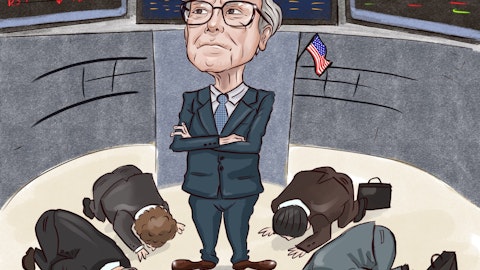Operator: American Express speaker line, are you guys there?
Kartik Ramachandran: Operator, can you confirm if you can hear us in the room?
Operator: I can hear you. [Technical Difficulty] Ladies and gentlemen please stand by. We’ll continue with the next question in just a moment.
Stephen Squeri: Hello. Can you hear us? Hello.
Operator: Hi. I can hear you. Can you hear me? Hi. This is Rob. Can you hear me?
Kartik Ramachandran: Operator, can you confirm if you can hear us now?
Stephen Squeri: I can hear you. Daryl, do you hear them?
Operator: Hi. This is — I can hear everyone. I’m not sure. Please stand by while we check. We’re experiencing some technical difficulty.
Kartik Ramachandran: For folks attending the call, we are going to dial back in. So please stay on the line. Or if the call does drop, we ask you to dial back in. Thank you.
Operator: Ladies and gentlemen, please remain on the line. We will — call will resume momentarily. Thank you. You guys are back. Are you able to hear me?
Kartik Ramachandran: Yes, operator. Thank you. Please go ahead.
Operator: Okay. So that last question was from the line of Craig Maurer with FT Partners. Craig, you may have to ask your question again.
Stephen Squeri: Yeah. We didn’t hear it.
Craig Maurer: No problem. Thanks and good morning again.
Stephen Squeri: Morning.
Craig Maurer: So wanted to ask about the assumptions later in the deck. It looks like you’re assuming a firmer economic environment for quarters two and three. So taking that with the benefit on rewards, should we assume there’s a larger buffer built into your guide because you didn’t raise EPS guide? And second, along the same lines, I wanted to ask about your loan workout program. Are you seeing any change in terms of the pace of loans being added or loans being worked out and how loans are progressing through that program? Thanks.
Christophe Le Caillec: Okay. Hey. Good morning, Craig. Under how we think about the balance of your so — we — as I say, we are going to stick to our EPS guidance, not going to change that range at this point in time. There are still a lot of things that need to play out in the balance of year end. We think that that guidance best represent what we expect at this point in time. Specifically about how to think about that URR benefit, as I said in my prepared remark, I would say that a significant portion of that benefit was reinvested on the marketing line. We knew — we saw that benefit coming in the quarter, and we took advantage of that as well to dial up the marketing. So all-in-all, it doesn’t have a meaningful impact on EPS for the full year.
When it comes to their — what we call their financial relief program and the modified loans, so this is an important program for us. We have — within one of their best program in the industry, we have innovative. For instance, we have a short-term program. We are also, in that short-term program, enabling the card members to retain some spend capacity and usage of the product. So we really think that it’s a differentiator to help the card members that are experiencing stress. So that program is working really well for us. It’s very effective. And what I can say is that the enrollment in the program has moderated in Q1, and that the performance of the card members within this program is very, very strong. We have a ton of metrics. We — one of the metrics we talked about in the past was we are looking at payment loyalty and how much the card members who are either in delinquent status or paying us versus paying our peers.
And we like what we’re saying, right? We’re typically front of their wallet in terms of repayments, and it’s definitely contributing to the strong credit metrics that you’ve seen. We think it’s also consistent with our brand in terms of being there for our card members and having their back. So that program is working well. But just to be specific on your question, the enrollment in this program is moderating in Q1.
Operator: Thank you. Our next question comes from the line of John Hecht with Jefferies. Please proceed with your question.
John Hecht: Morning, guys. Most of my questions have been asked. So I guess I’m going to ask about the Visa and Mastercard settlement, a reduction in interchange rates, and then some steering mechanisms. And I know historically, given your premium brand and so forth, those actions haven’t had any impact on the business. But we haven’t talked about that for a while. So I’m wondering if you guys just have some updated thoughts about that.
Stephen Squeri: Yeah. Well, it’s really hard to say how it’s going to play out over time. I mean, this has been going on probably close to 20 years, and it still has to be approved by the courts and we’ll see. But what I would say is it really doesn’t change sort of our strategy in any way. I mean, we are still focused on premium customers. Our customers still engage with the products. We’ll demand to use the products. And we’ll still maintain our virtual parity. So we’ll see how it all plays out, but we are going to continue to focus on what we control. And the only other thing I would say is that our pricing is policies and structures are fundamentally different than the networks.
Kartik Ramachandran: Operator? [Technical Difficulty] screw around dialing.
Operator: Ladies and gentlemen, thank you for your patience and standing by. Our conference will resume momentarily. We are experiencing technical difficulties. Please remain on the line. And once again, your conference will begin shortly. Thank you so much for joining us. Okay. You are back in.
Kartik Ramachandran: Operator, we can hear you. Can you go ahead and ask for the next question, please?
Operator: Sure. Our next question comes from the line of Jeff Adelson with Morgan Stanley. Please proceed with your question.
Jeffrey Adelson: Hey. Good morning, guys Can you hear me okay?
Stephen Squeri: Yeah, we can.





